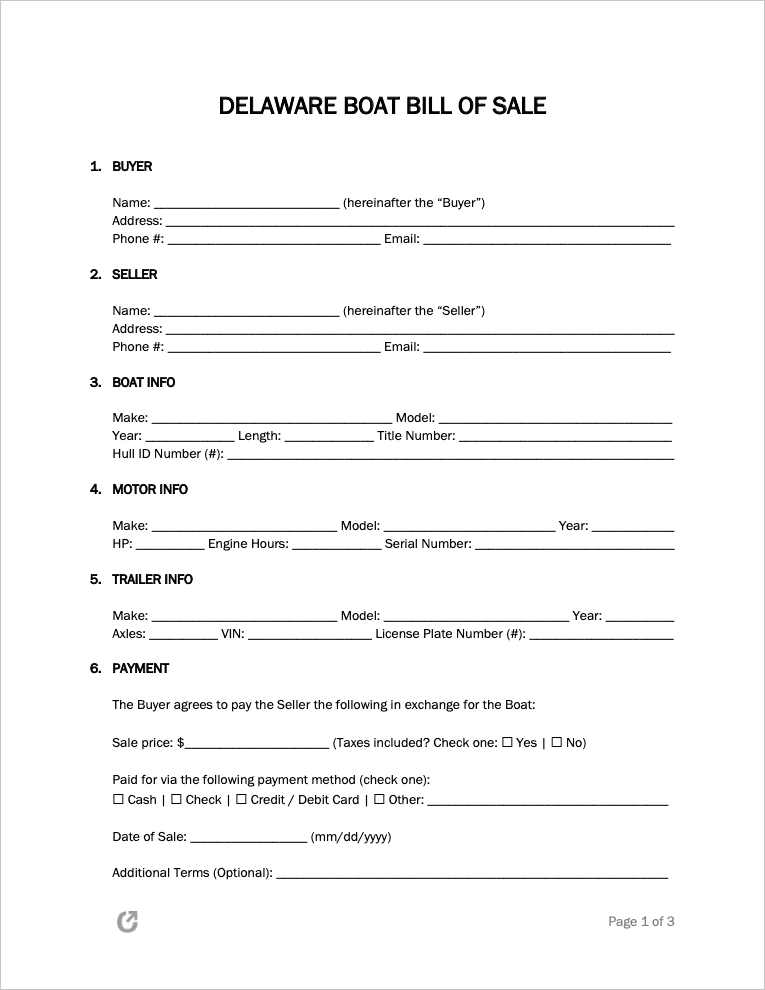Delaware Firearm Bill of Sale Form
A Delaware firearm bill of sale form addresses the context of a sale between two (2) individuals. It highlights the date of the purchase, the credentials of each person, the particulars of the weapon(s), and the payment type. The buyer and seller complete the form with one another and make copies to keep. Maintaining a record ensures that the appropriate parties can reference it later, especially if handling legal matters.
|
What is a Delaware Gun Bill of Sale?
A Delaware gun bill of sale reports crucial information relating to firearm ownership change of a firearm. It proves that the buyer and seller willingly entered an agreement, then carried out the exchange in the listed manner. Both individuals can use the form as proof of purchase and/or possession.
Residents do not need a purchase permit to own or carry handguns, rifles, or shotguns. Although buyers do not need licenses, sellers must still make sure that the person can lawfully purchase a firearm. Individuals who sell to felons, domestic abusers, addicts, or mentally unstable citizens can face jail time and fines.
Each person completing the form must read and understand the “Seller’s Disclosures” and “Buyer’s Disclosures.” Their signatures at the bottom of the second page indicate their agreement to the terms and verify they can possess a firearm. Police officers can arrest and ticket individuals who provide false information and/or wrongfully agree to the disclosure.
How to Apply for Concealed Carry License
According to state law, residents twenty-one (21) years and older can purchase and open carry handguns. Individuals must be at least eighteen (18) years old to buy or open carry unloaded shotguns and rifles. Anyone with a gun in public must stow it where others can see it.
Residents can open or concealed carry on their property. However, they must securely lock away their guns so that children or restricted people cannot gain access. If they fail to follow this rule, they can endure jail time or fines (§ 1456). If someone steals the gun, the owner must report it as missing no more than seven (7) days later (§ 1461).
Gun owners cannot concealed carry their guns in public unless they have a valid license to carry concealed weapons (CCDW). The Delaware Courts review the paperwork and approve or deny applicants. Residents must follow the steps below to apply.
Step 1 – Publish a Listing
Applicants must post a listing in their local newspaper explaining their plans for obtaining a CCDW. The paper must circulate to at least 35% of the zip code’s population. It must also use the individual’s full name and current home address.
The publishing must occur no more than ten (10) business days before submitting the CCDW application. After posting, the newspaper company must give the applicant a signed affidavit confirming this step. The person applying must attach the testimony to their application.
Step 2 – Background Check
The applicant must go to a State Bureau of Identification (SBI) office to have their fingerprints taken no more than forty-five (45) days before sending the application.
Individuals must keep the receipt after paying for the fingerprinting services because they must include it in their submission packet. Residents who have moved to Delaware within the past five (5) years must also provide the SBI with their certified driving record from their previous state.
Step 3 – Reference Questionnaires
Delaware requires applicants to have five (5) residents complete the reference questionnaire form. The individual filling out the form must: 1) not have relations with the applicant, 2) cannot live with the applicant, and 3) know the applicant for at least one (1) year.
The reference must provide their personal information and answer the questions provided therein. They must list their concerns (if any) about the applicant having a CCDW and state the reason(s) why they need the license.
Bring the Following:
|
Step 4 – Complete + Notarize Application
Once the individual completes the application, they must bring the document to a Prothonotary Office for notarization. The notary public witnesses their signature and then provides their official stamp, seal, or signature.
The submission packet must include the following:
- The notarized application;
- The affidavit from the newspaper company;
- The five (5) separate questionnaire forms;
- Two (2) official passport pictures (colored and 2″x 2″ in size); and
- A payment (cash, money order, or check) of $65 for filing.
After gathering this documentation, the applicant must drop off the packet or mail it to their local Prothonotary Office.
Step 5 – Receive Notice
The applicant must wait to hear back from the Attorney General’s Office and the Court. During this period, a representative may contact them for an interview.
Denied applicants state receive a written notice in the mail. Approved residents must take a gun course certificate (unless they recently completed a class and submitted certification).
Step 6 – Take Gun Safety Course
Applicants approved for a CCDW who have not taken a gun safety course must take the class within ninety (90) days. If they fail to meet this deadline, they must start the application process from the beginning.
The individual must receive education from a verified instructor. After completing the course, the instructor provides certification. The applicant must have the form notarized and send it to the state.
Step 7 – Wait for Response
The applicant must wait to hear back from the state once they submit the notarized certification document. If approved, the state will notify them by mail.
Step 8 – Renewal
CCDW holders can reapply for a license starting on January 2nd of the renewal year. They must bring, or mail, the following information to a Prothonotary’s Office:
- Notarized application (two (2) copies);
- Two “passport-style” photographs (in color) taken within six (6) months of applying; and
- Fees ($65).
